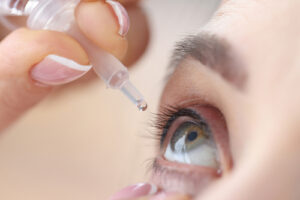Why Is Treating Dry Eye Important?
Are you one of the millions of Americans who struggle with dry eyes? Dry eye syndrome is a very common condition that can cause all kinds of discomfort, from itchiness to a burning sensation.
Living with dry eye syndrome can be frustrating. Fortunately, you don’t have to deal with it on your own. At Complete EyeCare West, our eye doctors are here to find a solution that works for you.
Not only can treatment make you comfortable again, but it can stop dry eye from causing further problems down the road. Keep reading to find out why treating dry eye is important!
What Is Dry Eye Syndrome?
Dry eye results when there is a lack of moisture in the eye. There are multiple factors that can lead to the development of dry eye syndrome.
Most often, the quality of tears is not sufficient enough to adequately lubricate the eye. In a healthy eye, tears coat the surface so it remains lubricated and smooth.

This layer of tears is called the tear film. Tears help coat your eye to help focus light and help protect your eyes from irritants.
Tears are produced by several glands that exist around the eye. The tear film that coats your eyes is made of three layers.
Any issue with tear production or the quality of tears can lead to dry eye. The first layer of a tear is made of mucus. This makes it so the tear film can stick to the eye.
In the middle is a layer mostly made of water. It also contains salt and proteins. In addition to providing lubrication, it supplies nutrients to the cornea.
Lastly, the outside layer is made of lipids. Because it is oily, it stops tears from evaporating too quickly.
What Makes Someone More Likely to Develop Dry Eye?
There are some factors that can make you more likely to develop dry eye. It is common to experience dry eye as you age, especially for women, due to hormonal changes associated with menopause.

As you age, your body naturally begins to produce less oil. When there is a lack of oil, tears cannot stay in the eye to lubricate it as long.
The environment around you can also dry out your eyes. Hot, dry, and windy air can make it hard for your eyes to stay moisturized.
Air conditioning, heating, and smoke can also affect your eyes in this way. You may find that your eyes feel dry in certain situations.
For example, many people experience dryness after extended periods of looking at a screen. Wearing contacts can lead to dryness as well because they absorb tears.
Finally, certain medications, like blood pressure medications and antihistamines, and certain health conditions, like vitamin A deficiency and Parkinson’s, can increase your risk of developing dry eye.
What Are the Signs of Dry Eye?
When your eye does not have adequate moisture, it can affect you in several ways. It is common to experience a gritty, burning, or itching sensation. This condition can make your eyes appear red as well.
Dry eye can make your vision blurry. You may find yourself blinking more often because it momentarily allows you to see better.
You may notice that your symptoms worsen after certain activities, like reading or looking at a screen. You naturally blink less during these kinds of activities, which only further irritates your already irritated eyes. 
Lastly, although it sounds counterintuitive, dry eyes can cause increased tearing. This occurs because the eye attempts to compensate for the lack of moisture and alleviate irritation by producing excess tears.
However, instead of moisturizing the eyes, the tears begin to run down the face instead.
What Happens If Dry Eye Is Left Untreated?
If dry eyes are bothering you, you should visit your eye doctor for diagnosis and treatment. Dry eye syndrome often does not go away on its own.
Not only can treatment allow you to see clearly and comfortably again, but it is also necessary in order to stop dryness from leading to further problems. Since tears protect your eyes from irritants like dirt and dust, a lack of them can leave your eyes open to infection and other issues.
Corneal abrasions can occur in severe cases of dry eye, especially if you rub your eyes. These are tiny scratches that appear on the surface of your cornea.
In addition to being uncomfortable, they make you even more vulnerable to infection. When damage occurs to your eye, it can blur your vision and even lead to permanent vision loss.
The best way to keep your eyes healthy and preserve your vision is to talk to your eye doctor about your dry eye as soon as possible. At Complete EyeCare West, your eye doctor can develop a treatment plan to help improve your symptoms.
How Is Dry Eye Treated?
There are many ways to treat dry eye effectively. At Complete EyeCare West, our eye doctors offer a range of treatment options so that we can provide the optimal solution for each person based on their needs.

If your dry eye results from medication or environmental factors, you may be able to find relief by switching medications or altering the environment around you. Artificial tears are commonly recommended for less severe cases of dry eye syndrome.
If your eyes are missing moisture, primarily due to specific environmental and situational factors, this can be a sufficient way to add moisture back into the eyes. If artificial tears are not enough, your eye doctor may prescribe eye drops.
Restasis or Xiidra are two popular, effective options. Not only do these provide moisture, but they also decrease inflammation. Steroid eye drops can help with inflammation as well.
Other dry eye treatments include meibomian gland expression, warm compresses, intense pulsed light treatments, and punctal plugs. Your eye doctor will discuss your needs and options to determine your ideal course of treatment.
Are you experiencing symptoms of dry eye? Schedule an appointment at Complete EyeCare West in Columbus, OH, today!







